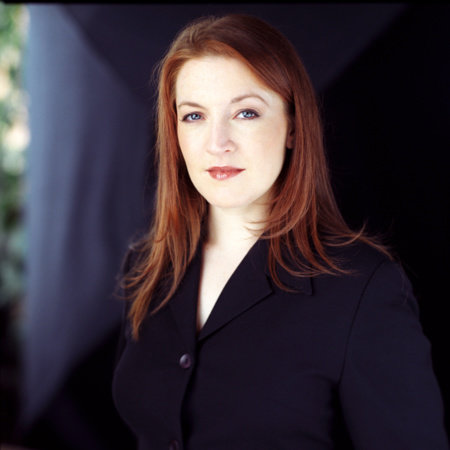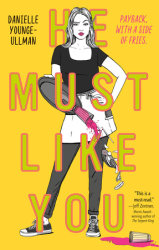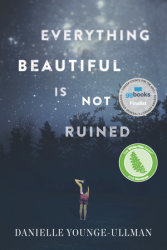Danielle Younge-Ullman’s Everything Beautiful Is Not Ruined is pitched as Wild meets ‘Gilmore Girls,’ and I would be hard-pressed to find a more accurate way to describe this story. It tells the tale of sixteen-year-old Ingrid’s highly reluctant participation in Peak Wilderness, a trip she agreed to take in return for her mother agreeing to let her attend a performing arts school in London for her senior year of high school.
When Peak Wilderness turns out to be a lot wilder than Ingrid was led to expect, she begins writing furious and beautifully wordy letters to her mother in a journal she’s carrying with her. Through her letters, and her candid, sharp narration, we get to know the history of Ingrid’s relationship with her mother, the once-great opera singer Margot-Sophia Lalonde, who has since fallen from grace. Everything Beautiful Is Not Ruined is a riveting story of a heartbreakingly close mother-daughter relationship, a brutal trek through the wilderness with strangers who become familiar, and a girl’s journey to finding her own place amid all the madness.
Read on for our Q&A with the author about her own relationship with her mother (and her own wild camping trip as a teen), her acting career, and how Ingrid came to life.
PENGUIN RANDOM HOUSE:You open the novel with a letter from Ingrid to her mother, full of biting sarcasm and resentment for being sent on a brutally intense trip through the wilderness. The voice of the letter is so striking! Did you have Ingrid’s voice in mind from the beginning? And if not, what was it like developing it?
DANIELLE YOUNGE-ULLMAN: Ingrid’s voice just came out like that. Part of the reason is that, as an author, voice is one of the things that come more easily to me than certain other aspects (like outlining and plotting, for example). But the main reason is that when I was a teen my mom sent me on a similar wilderness trip to the one Ingrid is on in the book, and while the backstory and circumstances were completely different, I was just as furious and confused, and when I started writing it was easy to reconnect to those feelings.
SIG: You dedicated this novel to your mother, and are careful to note in the dedication that your mother is nothing like Ingrid’s mother, Margot-Sophia (good thinking). If you didn’t draw from your own relationship with your mother, are there any mother-daughter relationships from fiction that inspired you?
DYU: LOL re “good thinking” … I agree!
I am really close with my mom, and I always have been. And while it’s true that she’s nothing like Margot-Sophia—not in personality, looks, or biographical details—I did still draw on my relationship with her in many ways. The biggest, as per my above answer, being my feelings of fury and confusion while on that long-ago wilderness trip. It goes deeper than that, though. My parents split when I was ten, and there were very few How-To books about divorce back then, so I really experienced the divorce with my mom.
As a kid, when the adults around you fall apart it’s very unnerving, and being my mom’s confidante made me feel more secure. I did not find a way, and did not want to find a way, to distance myself from her pain. And I really hero-worshipped her during that time, and saw how strong she had to be to pull her life back together, even while she was, at the same time, in so much pain and so frighteningly vulnerable. That combination of strength and fragility definitely went into Margot-Sophia, and the helplessness I felt went into Ingrid.
Because of how deeply I identified with my mom during and after the divorce, I found as I grew older—into teenage-hood and even into my twenties—I had a very hard time finding and drawing the lines between what was her and what was me. We had the usual mother-daughter fights over curfews and homework, but we stayed close.
Because of the intensity of the early years, however, it took me a long time to stop feeling responsible for her feelings, and it was extra hard for me as time went on, to make life decisions that I knew she wouldn’t agree with, or that might make her feel scared, or sad, or worried. It took me a long time to figure out how to fully be me, and have internal boundaries, while still maintaining this relationship that means so much to me.
So, as you can see, though the biographical details of Margot-Sophia and Ingrid are different (and so much worse), there’s a lot that mirrors the emotional essence of my relationship with my mom in this story.
PRH:Can you speak to the silence that plagues Ingrid’s relationship with her mother, and the importance of music and writing in the face of that silence?
DYU: Margot-Sophia is hard for Ingrid to navigate. She’s not touchy-feely, she’s volatile, and though there’s a lot of love there, Ingrid has to choose her actions and words with care. On Margot-Sophia’s side, she is complicated, barely holding herself together some of the time, and really turns inward instead of reaching out to her daughter. She may believe her silence is protecting Ingrid, but all the things they leave unsaid leak into their life and relationship anyway.
For Ingrid, writing in the journal is a way for her to be real about her feelings, to ask questions, to express the things she’s never expressed to Margot-Sophia. This act of writing helps her cope, gets her to the truth, and slowly begins to help her heal.
Music, for both of these characters, is so loaded. It’s something they have in common and both love, it saved Margot-Sophia as a teenager and gave her a career, and the loss of it broke her. In their new life, Margot-Sophia banishes music, but that doubles the loss Ingrid experiences. For Ingrid, finding her way back to music is a way of finding her way back to herself.
Ingrid’s most euphoric and connected moments in her Wizard of Oz performance are also the moments when she finally, viscerally, understands what her mother accomplished, and what she lost. Margot-Sophia could never have fully explained this to Ingrid, and never really tries—Ingrid has to experience it herself. And then she must somehow reconcile all of this in order to go after the life she wants.
PRH:Did you spend any time camping in the name of research?
DYU: Enough of the details of my own wilderness adventure were burned into my memory for me to write most of the book, though my adventure did not end up including a canoe trip. However, I once went on a four-day canoe trip while at camp as a little kid (which I loved, btw) so I had most of what I needed. I like to be thorough, though, so I also consulted with a teenage cousin of mine who’s done a bunch of camping trips to make sure I had updated terminology, and to get a bit more detail about current day canoeing and camping practices.
PRH:Do you think we should be turning to nature more than we do when feeling stressed or overwhelmed, rather than, say, turning to Netflix?
DYU: Yes! There is so much science about how being in nature soothes us, and despite being a bookworm, I always feel re-balanced by time spent outside. I really enjoy skiing, snowshoeing, hiking, swimming, kayaking and campfires—I just want a shower and a roof over my head at the end of the day. (And, er, maybe some Netflix?)
PRH:In what ways did you bring your acting background into this book? Did it help to inform your characterization of Margot-Sophia?
DYU: My husband and I were both actors when we met. When he finally read Everything Beautiful is Not Ruined this past summer, he came and found me, tears in his eyes, and said, “You’ve written a love letter to the theater.” It’s much more than that, of course, but he’s right. There is nothing like rehearsing and then putting up a show. There’s so much connection involved—connection to the piece and creator of it as you grapple with meaning and intent, connection to the your fellow performers and everyone involved with the show, connection with yourself as you look to find what you have in your inner toolbox that can help you play the character, and then of course it all builds to the indescribable connection you can have with your audience. I walked away from that for good reasons, and I don’t regret them. But it hurt to lose it, and it still hurts. For years I stopped going to the theater altogether. I funneled a lot of my feelings about that into the story, for both Margot-Sophia and Ingrid.
I’ve read books with a defy-the-world/your-parents and go into the arts narrative—books that make it clear that the protagonist, having defeated their external obstacles and finally believing in themselves, is going off into the sunset of meant-to-be stardom. I don’t dislike those stories, as they’re very hopeful and we need hope. I wanted to tell a slightly different story—one that shows the grit and resilience that’s continually required for a career in the arts, and the heartbreak of failure.
Margot-Sophia isn’t opposing Ingrid because she doesn’t understand the lure of the arts—she understands all too well, and doesn’t want Ingrid to experience the horrendous loss of career and identity that has defined her. Ingrid, too, has experienced this loss in her own way, and so finding her way to singing and acting is fraught, and falling in love with it is fraught. When she commits to pursuing it, it’s not in a naïve way—it’s bittersweet, it’s realistic, and yet still manages to be hopeful.
From a skills standpoint, my acting background affects the way I approach both character and dialogue. I get into character for writing the same way I did as an actor, using many of the same tools. And I write dialogue the way I would want to speak it or hear it spoken, and try to make it as natural as possible.
PRH:You covered some pretty heavy topics in this novel, like depression, sexual assault, and suicide. What was it like, navigating these topics? Do you have any advice for writers on how to handle them in their own writing?
DYU: To me it’s natural, even essential, to write about the hard stuff. There tend not to be many straight-out villains in my books, because what interests me is looking at characters who are multi-faceted, who are their own worst enemies, and then digging into that to see how it plays out in their lives and their relationships.
I like grey area, and I want readers to find ways to empathize with (almost) every character. I think, hope, that that’s the key—to approach these heavy issues with empathy, in depth, and also with the occasional bit of well-placed humor. Peace-Bob is the exception to my empathy-for-all tendency, and is the most purely gross character I’ve written. I did, however, use some humor in depicting him, albeit humor with a dark edge and a purpose.
As far as advice to other writers … everyone has their own way, but aside from what I’ve said already, if you’re going to write about a difficult issue, make sure you know your stuff—either from personal experience, research, or both…and then go for it.












